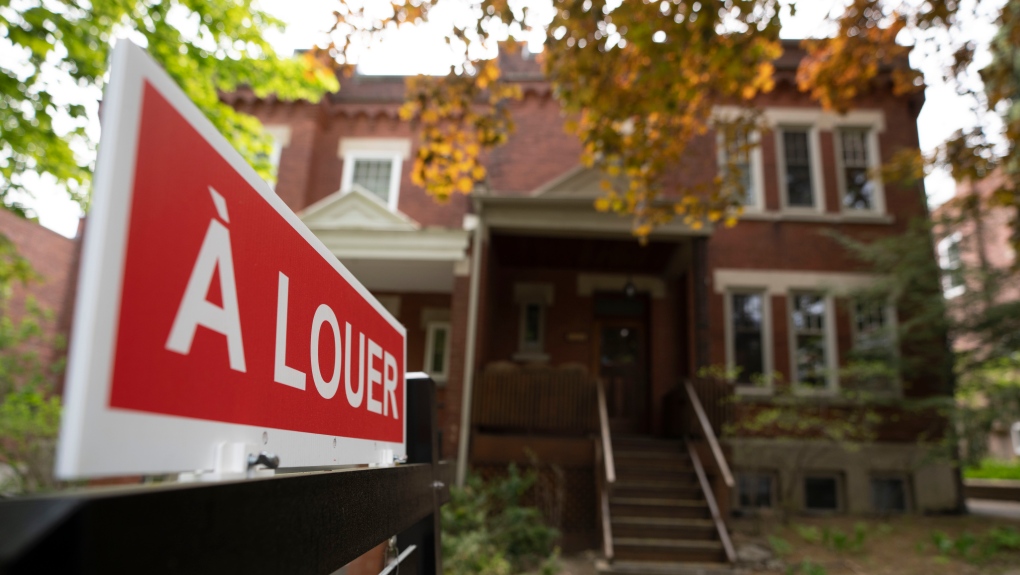Quebec's controversial housing bill could be adopted next week
 Real estate signage showing a home for rent is seen on Monday, May 15, 2023 in Montreal. THE CANADIAN PRESS/Christinne Muschi
Real estate signage showing a home for rent is seen on Monday, May 15, 2023 in Montreal. THE CANADIAN PRESS/Christinne Muschi
As the housing crisis continues to worsen in Quebec, the detailed study of Bill 31, which will limit the use of lease transfers, came to an end on Tuesday. Québec solidaire (QS) tried until the end to propose amendments, but was ultimately unsuccessful.
Housing Minister France-Élaine Duranceau said the bill could be adopted early next week, but the commission's report must be reviewed by the Quebec legislature first.
"It's a great day," said the minister at the end of the commission, admitting the bill alone won't solve the housing crisis.
QS MNA Andrés Fontecilla, meanwhile, raised several criticisms of the piece of legislation in his closing remarks.
"I can only oppose the adoption of Bill 31," he said.
'Chaotic'
The study of the bill was laborious. Last October, the commission was suspended because several articles had to be rewritten. Opposition parties criticized the minister, accusing her of being disorganized.
A few days later, Duranceau said that if the bill wasn't passed by the end of 2023, the opposition parties would carry vulnerable tenants' "burden," a statement that set off a firestorm. The opposition slammed the door on the commission studying the bill, denouncing the minister's "blackmail" and "arrogance."
In her closing remarks on Tuesday, Liberal MNA Virginie Dufour described the study of the piece of legislation as "arduous."
"It was even chaotic, with the number of amendments that sometimes changed the very nature of the bill," she said.
Bill 31 has provoked uproar, particularly because it tackles the issue of lease transfers. The bill would allow a landlord to refuse a transfer for less-than-serious reasons.
Opponents sought to bend the minister on this issue with several amendments, but she remained adamant that this isn't the right tool to control rent prices.
Last week, Fontecilla also proposed amendments to extend the "Françoise David Law," aimed at better protecting seniors from eviction. The government also rejected QS's proposed amendments.
Duranceau justified her refusal by asserting that her bill would put several mechanisms in place to protect tenants from eviction, regardless of age. It will reverse the burden of proof for evictions to put the onus on the landlord.
If a tenant fails to respond to an eviction notice, he or she will not be deemed to have accepted it by default, as is currently the case. Finally, the legislation will also oblige a landlord who evicts a tenant to compensate him or her with one month's rent for each year of continuous residence in the dwelling.
The minister also had to defend a controversial amendment that will allow municipalities with a population of at least 10,000 and a vacancy rate of less than 3 per cent to disregard their urban planning regulations for construction projects of a minimum of three dwellings.
A municipality will also be able to waive its rules if the construction project includes a majority of social, affordable or student housing. A municipality wishing to use this measure need only hold a public meeting. This exceptional measure will have a maximum duration of five years.
Opposition parties fear that this amendment will have poor effects on urban planning.
CTVNews.ca Top Stories

Liberal MP says she's leaving politics over disrespectful dialogue, threats, misogyny
Liberal MP Pam Damoff says she won't run again in the next federal election, saying she has experienced misogyny, disrespectful dialogue in politics and threats to her life.
Concerns about Plexiglass prompt inspections at some Loblaws locations in Ottawa
Inspections are underway at more than one Loblaws location in Ottawa after complaints were filed about tall Plexiglass barriers.
Federal employees will be required to spend 3 days a week in the office
Starting in September, public servants in the core public administration will be required to work in the office a minimum of three days a week. The Treasury Board Secretariat says executives will need to be in the office four days per week.
OPP officer said 'someone's going to get hurt' before wrong-way Hwy. 401 crash
As multiple Durham police cruisers were chasing a robbery suspect on the wrong side of Highway 401 Monday night, an Ontario Provincial Police officer shared his concerns, telling a dispatcher, "Someone's going to get hurt."
Ont. woman who faked pregnancy to defraud doulas arrested again on similar charges
Victims of a Brantford, Ont., woman who was sentenced to house arrest earlier this year for defrauding and deceiving doulas say they’re not surprised she’s been apprehended again on similar charges.
Five human skeletons, missing hands and feet, found outside house of Nazi leader Hermann Göring
Archeologists have unearthed the skeletons of five people, missing their hands and feet, at a former Nazi military base in Poland.
Poilievre returns to House unrepentant for calling Trudeau 'wacko,' Speaker not resigning
An unrepentant Pierre Poilievre returned to the House of Commons on Wednesday to pepper the prime minister about his drug decriminalization policies after being booted the day prior for refusing to take back calling Justin Trudeau 'wacko' over his approach to the issue.
Construction begins on LGBTQ2S+ national monument in Ottawa
Shovels have hit the ground for constuction on Canada's LGBTQ2S+ national monument in Ottawa.
B.C. man awarded $5,000 in damages in first-of-it-kind intimate image case
In a first-of-its-kind case, a B.C. tribunal has ruled on a dispute involving the non-consensual sharing of intimate images, awarding damages and issuing orders that the photos be destroyed and taken offline.

































